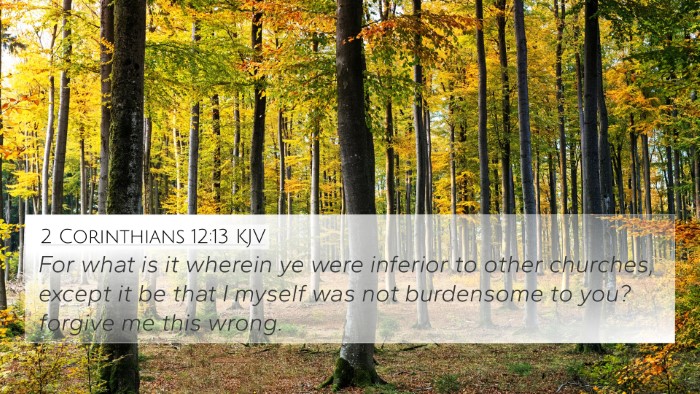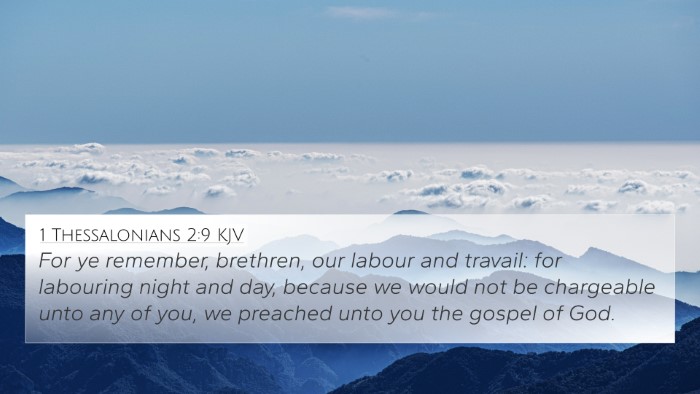Understanding 2 Corinthians 11:7
Bible Verse: 2 Corinthians 11:7
“Did I commit a sin in humbling myself so that you might be exalted, because I preached God's gospel to you free of charge?”
This verse reflects the Apostle Paul's deep concern for the Corinthian church and his defense of his ministry. In this passage, Paul presents several critical themes that can be explored through various biblical lenses.
Meaning and Context
In Paul’s second letter to the Corinthians, he defends his character and ministry against false apostles. This particular verse addresses the accusation of being a humble servant of Christ, suggesting that humility might have been misrepresented by his critics. Let us delve into the insights provided by notable public domain commentaries.
Insights from Matthew Henry
Matthew Henry highlights that Paul's willingness to serve the Corinthians without charge demonstrates his sincerity in sharing the gospel. He notes that Paul's humility is not a mark of weakness but a strategic choice aimed at elevating the message of Christ and safeguarding the congregation from the influence of false teachers. Henry emphasizes that true servants of God may sometimes face slander for their humility, but this is often a reflection of their commitment to the integrity of the gospel.
Comments from Albert Barnes
Albert Barnes provides a thorough explanation, positing that Paul's humility was a form of service, showing love and concern for the Corinthian believers. He draws attention to the cultural context where a teacher would typically charge for their teachings. By preaching without financial gain, Paul directly contrasts the motives of others who sought monetary gain from their ministry. Barnes suggests that this act of selflessness should be seen as an embodiment of true Christian love and devotion.
Thoughts from Adam Clarke
Adam Clarke expands on the implications of Paul’s rhetorical question, asking whether his humble approach was a sin. Clarke argues that Paul likely anticipated criticism and sought to clarify his intentions. His emphasis on preaching 'free of charge' underscores a wider theological principle: the gospel's accessibility. Clarke stresses that the message should inherently be free, as it carries the divine truth of salvation.
Key Themes and Interpretation
- Humility in Ministry: Paul’s humble approach serves as a model for Christian leaders today. It stresses the importance of serving others selflessly.
- Accusation of Selfishness: This verse challenges the ethics of those who might accuse servants of God when they choose voluntary poverty for the sake of others.
- Preaching the Gospel: It highlights the significance of delivering the gospel freely, thus making it accessible to everyone without financial barriers.
Bible Verse Cross References
To deepen the understanding of this verse, consider these related scriptures:
- 1 Corinthians 9:18: “What then is my reward? Just this: that in preaching the gospel I may offer it free of charge, and so not make full use of my rights as a preacher of the gospel.”
- Matthew 10:8: “Heal the sick, raise the dead, cleanse those who have leprosy, drive out demons. Freely you have received; freely give.”
- Galatians 5:13: “For you, my brothers and sisters, were called to be free. But do not use your freedom to indulge the flesh; rather, serve one another humbly in love.”
- Philippians 2:7: “Rather, he made himself nothing by taking the very nature of a servant, being made in human likeness.”
- Romans 12:3: “For by the grace given me I say to every one of you: Do not think of yourself more highly than you ought, but rather think of yourself with sober judgment.”
- 2 Corinthians 12:14: “Now I am ready to visit you for the third time, and I will not be a burden to you, because what I want is not your possessions but you.”
- Acts 20:33-35: “I have not coveted anyone's silver or gold or clothing. You yourselves know that these hands of mine have supplied my own needs and the needs of my companions.”
Thematic Connections in the New Testament
This verse serves as a beacon for exploring broader themes within the New Testament, such as:
- Service to the Church: Paul’s attitude embodies a call for all believers to serve without expecting something in return.
- Cultural Context of Giving: Examining how societal norms impacted the understanding of free ministry in the early church.
- The Role of the Apostles: Discussing the unique responses of the apostles to the challenges of their evangelistic efforts.
Exploring Inter-Biblical Dialogue
The connections between this verse and others provide a rich landscape for study. As one examines these cross-references, the tapestry of Biblical teaching on humility and service becomes clear. This inter-Biblical dialogue emphasizes how similar themes resonate throughout Scripture.
Tools for Bible Cross-Referencing
To delve deeper, various tools can aid in cross-referencing:
- Bible Concordance: A concordance can help locate scriptures that share similar themes or vocabulary.
- Bible Cross-Reference Guide: Guides provide systematic tools for finding related verses.
- Bible Study Methods: Engaging in cross-reference Bible study methods enriches understanding.
How to Find Cross-References in the Bible
Utilizing a systematic approach aids in linking Bible scriptures effectively:
- Identify key themes or words from the verse.
- Utilize a concordance to locate related scriptures.
- Engage with commentaries that provide insights into connections.
Conclusion
In conclusion, 2 Corinthians 11:7 is a pivotal passage that encourages a deeper understanding of humility in ministry, the free offering of the gospel, and the nature of true service. By exploring cross-references and engaging with commentaries, believers can recognize the profound implications this verse holds for their faith and practice. Understanding these connections not only enriches personal study but also prepares one for sharing the gospel effectively within their communities.












